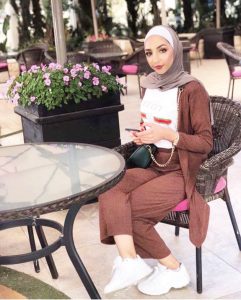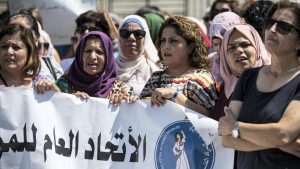The So Called “Honour” Killing Of Israa Ghrayeb Is A Stark Example Of Why Honour Culture Needs To Die A Death
The latest story about a brutal honour killing in Palestine feels poignant not just because of how harrowing the murder was, but because Israa Ghrayeb, the victim, could have been any one of us.
By Hana Chelache and Momin Taha
Israa Ghrayeb (also referred to as Israa Ghareeb or Esraa Ghareeb) was a 21 year old Palestinian woman from Bethlehem who had a lot going for her. She was a talented makeup artist with a large following on social media and was also engaged to be married. People who knew her have described her as hardworking, sweet and beautiful. Sadly, any dreams Israa had will now never be. Late last month, Israa became the victim of a brutal honour killing at the hands of her father and brothers.
Firstly we must summarise what happened to Israa (and acknowledge that there are some contradictory accounts online). Shortly before she was due to marry, Israa Ghrayeb and her fiance met at a cafe, accompanied by her sister. She posted a video of the meetup on Snapchat. Israa’s uncle saw the picture and complained to her father and brothers that the date, her love of makeup and the way she dressed where dishonouring the family’s reputation. What happened next is very disturbing. Accounts tell that when she returned home Israa was severely beaten by her father and brothers and was taken to hospital with severe spinal cord injuries, requiring surgery. Despite her condition she showed remarkable resilience whilst in hospital, posting a picture of herself online, telling her followers, “Don’t send me messages telling me to be strong, I am strong. May God be the judge of those who oppressed me and hurt me.”
After receiving spinal surgery, a group of her male relatives went to the hospital and attacked her violently. Sadly, the doctors and nurses stood aside while this happened. Some speculated that this is because they feared repercussions for themselves if they were seen to intervene. However, a harrowing recording does exist of Israa screaming for help as she was beaten. Israa Ghrayeb died shortly afterwards. The family members who attacked her have since been charged with her murder by the authorities.

Before they were charged her relatives made victim blaming statements accusing her of being mad and possessed by jinn (evil spirits or demons) that they were trying to exorcise. Unfortunately, a minority of online commentators have stooped low enough to uphold this toxic narrative.
Femicide is of course a global problem but as tragic as the case of Israa Ghrayeb is, this is not just an isolated incident of an abusive family murdering their child, but part of a wider practice known as honour killings. In some high control or extremely reactionary Arab and South Asian communities, a family’s honour is tied up with how individual members of the family, especially the young women are seen by the wider community. If a member of the family transgresses against a code of honour, then the family as a whole has been dishonoured, in the community’s eyes. In very extreme cases, members of the family or wider community assault or kill that person to restore the family’s honour. Reasons for honour killings have included a woman choosing a husband that the family did not approve of, acting in a way that is perceived as immodest or being discovered to be LGBT. According to Palestinian NGO Against Domestic Violence Against Women, this is the 19th known honour killing case in the Palestinian territories, in 2019. They also report that 12% of known homicides in the Palestinian territories are honour killings. Unfortunately honour based violence and murder is a problem throughout the wider Levantine region, with nearby Jordan having one of the highest rates of honour killings in the world. Many honour killings and instances of honour based violence also go unreported because they are conducted by people who are close to the victim.
This story has sparked outrage globally but has especially struck a chord amongst progressive people in the Arab world. As of early September, the hashtag #WeAreAllIsraa has been tweeted over 50,000 times on Arabic language Twitter. Large numbers of people in the Palestinian Territories have also attended peaceful protests demanding justice for Israa and the government to do more to protect the women from violence, including honour based violence. There is a sense that people are absolutely sick of these sorts of things happening and are hungry to see real change.

Britain’s progressive Arab community are also similarly outraged. Alham Akhram, Founder and Director of BASIRA, British Arabs Supporting Universal Women’s Rights says, “We call for justice and equality of all women. We want a change in the laws in the Arab region that give lenient punishments to murderers when it is a so called “honour” killing. We want a full and open investigation of Israa Ghrayeb’s murder, to learn the truth about what happened and we want her murderers held to justice.”
Palestinian human rights workers based in Great Britain are also planning to organise a protest to demand justice for Israa outside the Palestinian Consulate in London, which they are asking the British public to come to and support.
So what needs to change to protect more young people befalling the same fate as Israa? Firstly, the laws surrounding honour crimes in the Palestinian territories are grossly inadequate. A legal loophole based on article 340 of the Jordanian penal code, states that a murderer can have their sentence reduced to just six months if the perpetrator states that preserving their honour was a motivation. A form of what translates into English as “social law”, “tribal law” or “clan law” is also widely practised, where the killer’s sentence can be reduced if the family of the murdered person agrees to forgive them. These sorts of laws that put a family’s so called “honour” above protecting victims of murder and domestic violence shouldn’t have a place in the 21st century, infact, they’re an absolute joke. The Palestinian Authorities promised to overturn these laws in 2014, but little progress has been made to do so and unfortunately, we are not holding our breath.
What also needs to change are the bad ideas that lead to these sorts of crimes being committed in the first place. It is stifling to expect young people to live their lives according to a code of honour, that is defined by forces beyond their control. Surely individual rights, such as the right to socialise with who you please, choose who you love or marry, the right to a private life or the right to freedom of expression should come before community rights and expectations. There is no point blaming the victims of honour crimes, or suggesting that there are actions that they could have taken to avoid their fate. Today, its the girl who met her fiancee in a coffee shop, tomorrow its the woman who dressed too “provocatively” for her family’s liking, after that its the man who was found to be gay. The most pious or profane person could find themselves on the wrong side of honour culture, there’s no point trying to appease it. Better the idea that someone needs to be punished for transgressing social norms dies a death instead.
We’ll end this article with the worlds of Dina Tadrous, a 23 year old Palestinian woman who spoke to journalists at a recent women’s rights protest in Ramallah. “Her story actually talks about the story of every woman in Palestine,” said Tadrous, “Every woman who is at risk of getting killed because she wanted to express herself freely.”
When we think of Israa Ghrayeb’s story, what strikes us most however is how normal her actions were. We think of ourselves, and all the people we know who have been on a date, who have met our partner for coffee, who’ve shared aspects of our lives on social media, taking it for granted that it would not put our lives at risk. The only difference between us and Israa was how we were treated by the people in our lives. In that sense, I am Israa, you are Israa, we are all Israa.
Israa Ghrayeb’s brother is of Canadian citizenship and is currently studying in Greece. There is a petition online asking the authorities there to prosecute him. Sign the petition.
